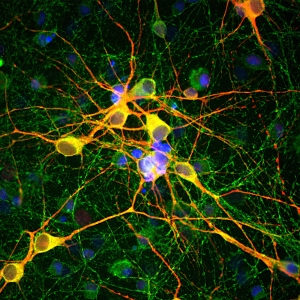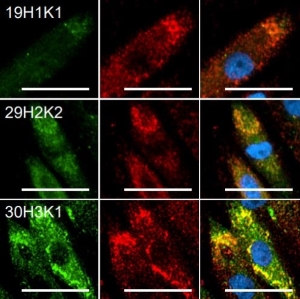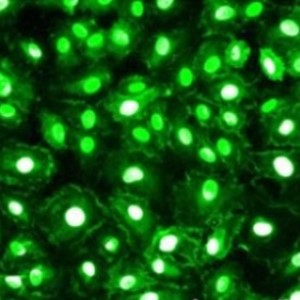Over the past few weeks, we've seen a bunch of new publications come through from customers highlighting the capabilities of our many products. These include two studies using some of our highly touted pain research antibodies in migraine and neuropathic pain research. Additionally, one of our primary human cell types was utilized in pancreatic cancer research. You can explore all citations using Neuromics products here.
In the first piece of research, migraine researchers used two of our Neuropeptide Y (NPY) receptor antibodies. The investigators injected mice with glyceryl trinitrate (GTN) in the medial habenula (MHb) to produce a migraine mouse model. Upon microinjections of NPY, the signs of migraine decreased in the GTN mice. Using our Rabbit Polyclonal NPY Y1 Receptor Antibody (cat. RA24506) and Rabbit Polyclonal NPY Y2 Receptor Antibody (cat. RA14112), the scientist observed activation of NPY Y1 receptors, but not NPY Y2 receptors.
Image: Immunofluorescent staining showing the expression of the Y1 receptor (cat. RA24506) and Y2 receptor (cat. RA14112) in the MHb of GTN mice after microinjections of NPY.

The second study used our Guinea Pig Polyclonal TRPV1 Antibody (cat. GP14100) in neuropathic pain research. The scientist found that targeting the a6-containing GABAA receptor in mice reduced pain in female rats, but not male rats. The investigators suggest the receptor should be further studied as a potential therapeutic target for neuropathic pain.
Image: Expression of TRPV1 (cat. GP14100) in DRG neurons of female naive rats.
In addition to these three antibodies, we carry more research provenpain antibodies with over 20 years of results. Check out one of our past blog posts to learn more.
Scientists also released preliminary research using our primary Pancreatic Cancer Associated Fibroblasts (CAF) Cells (cat. CAF118) to develop a pancreatic cancer 3D culture model. Hopefully, the model will be utilized to better understand the tumor microenvironment of pancreatic cancer, which is currently very difficult to treat and often deadly.
In case you missed it, Neuromics introduced seven CAF types earlier this year that also enable important research on the tumor microenvironment. That means we now offer a total of eleven CAF types. Learn more here.







